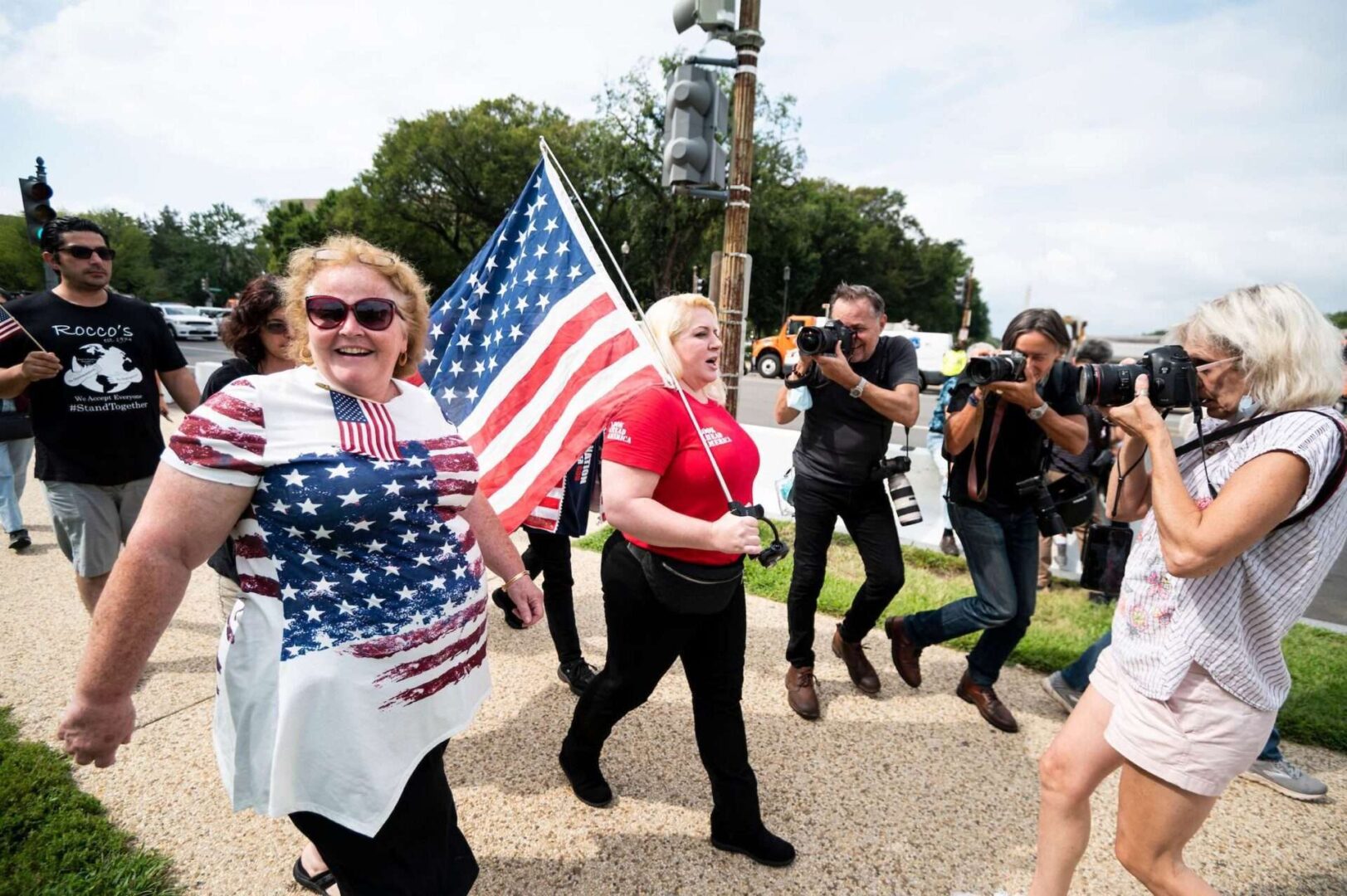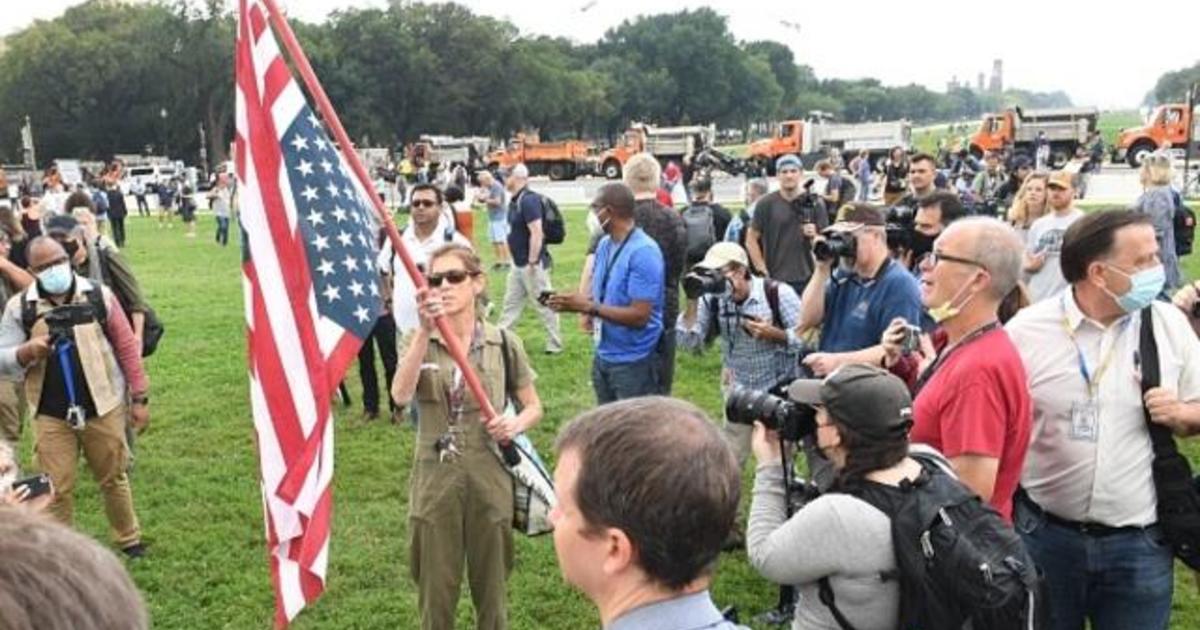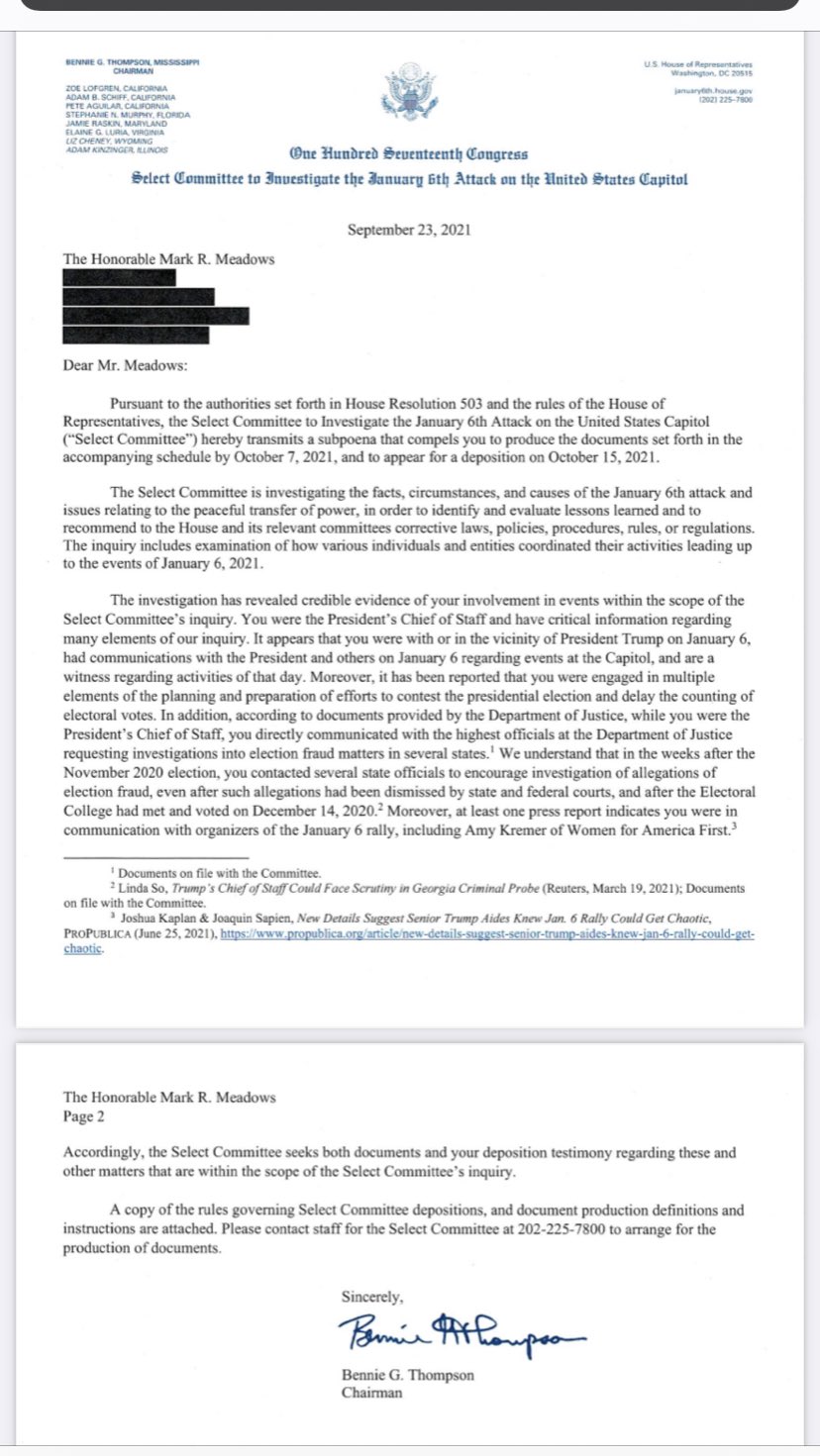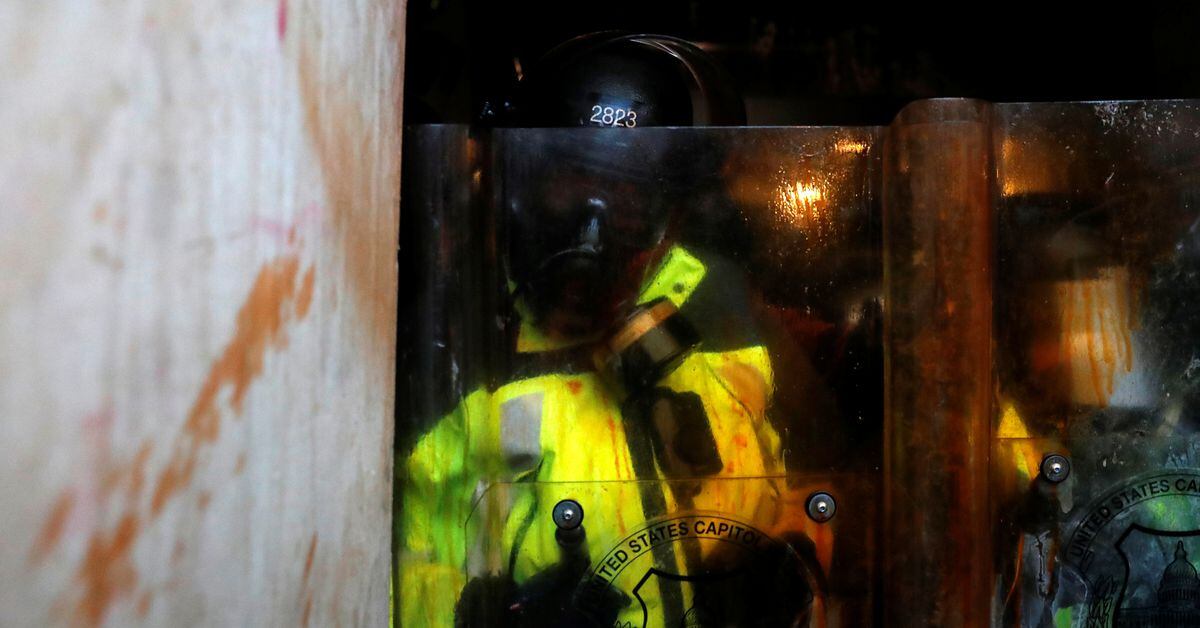Low turnout, low drama mark rally for jailed pro-Trump rioters
Law enforcement was prepped for large crowd that did not materialize
By Chris Marquette
Posted September 18, 2021 at 2:37pm

 www.rollcall.com
www.rollcall.com
The “Justice for J6” rally to advocate the release of jailed pro-Trump insurrectionists who attacked the Capitol on Jan. 6 lacked much drama Saturday. Only a small number of protesters showed up, matched by a heavy media and law enforcement presence.
Demonstrators came out on a muggy day in less than droves to a sleepy Capitol complex shrouded in a black security fence and a large law enforcement footprint, with members of the media appearing to rival the protesting crowd in size. Capitol Police put the turnout at the protest area at approximately 400 to 450 people.
Unlike Jan. 6, Saturday’s rally, which took place near the Capitol Reflecting Pool and lasted just over an hour, was not marred by violence. Capitol Police tweeted that one man armed with a knife was arrested on a weapons violation.
“What I’m asking you to do is to take your anger and channel it into something productive,” rally architect Matt Braynard, a former Trump campaign employee, said onstage as he closed the event. He encouraged the protestors to volunteer with his organization, Look Ahead America, and work to “fix our election system.”
“This is about disparate treatment of the nonviolent people,” said Braynard, who has promulgated former President Donald Trump’s false claims that the 2020 election was stolen from him. Braynard took a jab at the heavy police presence Saturday, but also thanked the officers ringing the Capitol. “A little bit of overkill, but, look, I respect it.”
Around 140 D.C. Police and Capitol Police officers were assaulted in the Jan. 6 melee, and the Justice Department has since arrested over 600 people in connection with the attack.
Look Ahead America secured a permit request for 700 participants in Union Square near the Capitol.
A man who identified himself as Kevin and didn’t give his last name said he flew from Utah to get to the demonstration because of what he called injustice being done to the imprisoned insurrectionists. “I’m actually surprised at all the media that’s here,” he said.
Kevin acknowledged the journalist-to-protestor ratio, saying people were afraid to attend the rally out of fear of “being vilified like the guys who are unjustly being kept under solitary confinement.”
Another man, who identified himself as Adam, said he was rattled when asked by CQ Roll Call for comment because he had already talked to so many journalists.
“Sorry, my exasperation,” Adam said, nothing that many reporters had asked about his reasons for attending.
‘Treated unfairly’
Sue, who also did not provide her last name, said she came to Washington on a bus from Long Island, N.Y., because the pro-Trump rioters in jail are being “treated unfairly.”
She said she wants charges against the rioters dropped or for them to receive a quick trial. The insurrectionists, she added, are in jail “because they have a different political position.”
Adam, 36, who drove overnight to D.C. from Florida, said he wanted to raise “awareness” for the prisoners, a goal he felt was already accomplished by the heavy media presence. He said he heard about the rally through the far-right site Infowars.
Adam said he was not advocating the release of violent rioters who assaulted police but the “grandma who walked through the velvet ropes, who was let in by the Capitol Police — that’s who I think shouldn’t be in prison right now. That’s all.”
Adam said he was present for the Capitol attack on Jan. 6 because of Trump.
“Our president brought me here on the 6th. The election brought me here on the 6th,” he said. “But that’s not why we’re here today.”
Despite some shows of support for the Capitol rioters since Jan. 6, GOP lawmakers steered clear of the event. But one Republican hoping to join their ranks showed up.
Joe Kent, a Trump-endorsed primary challenger to Rep. Jaime Herrera Beutler, R-Wash., told rallygoers to keep fighting for justice for the imprisoned insurrectionists. Herrera Beutler was one of the 10 House Republicans who voted to impeach Trump in January.
“Our enemies are those that will deny people of their constitutional rights and then take a narrative that labels all of us as terrorists and insurrectionists for just questioning things,” Kent said.
After the rally ended, law enforcement officers, some in riot gear, worked to separate pro-Trump protestors and counterprotesters near the rally site.
Abdul, 32, said he traveled from Albany, N.Y., to “smash fascists,” particularly “Proud Boys,” referring to the extremist group of self-described “Western chauvinists.”
Abdul, who did not give his last name, said he is “anti-fascist” and had been following the news about Saturday’s rally for weeks. His goal for making the 365-mile trek? “Run them out of town.”
‘Hearts and minds’
More than eight months after a violent mob of insurrectionists undertook one of the gravest assaults on American democracy, the Justice for J6 demonstrators arrived Saturday on the west side of the Capitol “demanding justice” for “political prisoners” and for rioter Ashli Babbitt, who was fatally shot by Capitol Police Lt. Michael Byrd while she was attempting to breach the Speaker’s Lobby on Jan. 6, and other civilians who died that day.
The Justice Department declined to prosecute Byrd, and Capitol Police decided not to discipline him. The force said Byrd acted lawfully and within department policy when he fired his pistol and hit Babbitt in the left shoulder with one round. Far-right groups have treated Babbitt, an Air Force veteran and follower of the QAnon conspiracy theory, as a martyr for their cause.
With the House and Senate both out of session on a weekend, the campus was largely vacant Saturday. Leading up to the rally, House Sergeant-at-Arms William J. Walker — on more than one occasion — wrote to members and staff, strongly encouraging them to avoid Capitol grounds. Congressional offices took precautionary steps, with some encouraging or mandating remote work in the days leading up to the protest.
Trump issued a statement Thursday in support of the jailed protestors and repeated the false claim that the 2020 presidential election was corrupted.
“Our hearts and minds are with the people being persecuted so unfairly relating to the January 6th protest concerning the Rigged Presidential Election,” he said. “In addition to everything else, it has proven conclusively that we are a two-tiered system of justice. In the end, however, JUSTICE WILL PREVAIL!”
‘Do justice’
Capitol Police Chief J. Thomas Manger faced his first major hurdle as the top official at a department plagued by mismanagement and a lack of preparation leading up to Jan. 6. In addition to erecting the fence, the force enlisted help from several law enforcement entities, including officers from the Washington, D.C., Metropolitan Police Department and from the police departments in Montgomery County, Md., and Arlington County, Va. The Pentagon also approved 100 D.C. National Guard troops to be on standby at the D.C. Armory in anticipation of the demonstration.
Leading up to the rally, a Capitol Police intelligence assessment noted that the force and other law enforcement agencies discovered increasing violent online chatter about the protest.
A discussion thread on the far-right site 4chan exhibited calls to “do justice” against “local jews and corrupted officials.” Further, it said the demonstration should be used as a way to participate in violent acts against local “Jewish centers and Liberal churches” while law enforcement is distracted. Another comment from the thread said, “I will be there with my AR15 even though legally I can’t have one f*** the Demonrats.”
Nine members of Congress were invited to attend the rally, but none appeared. Those invited were: Republican Sens. Ted Cruz of Texas, Tommy Tuberville of Alabama and Mike Lee of Utah; and GOP Reps. Louie Gohmert of Texas, Lauren Boebert of Colorado, Madison Cawthorn of North Carolina, Paul Gosar of Arizona, Marjorie Taylor Greene of Georgia and Matt Gaetz of Florida.
Gosar has questioned “who executed Ashli Babbitt” and used his official website to allege a “cover up” surrounding her death. Gosar, Taylor Greene and Gaetz have been associated with Look Ahead America in the past.
Look Ahead America has organized other events in D.C. for the same cause: one at the Department of Justice and one at the D.C. jail.
Gohmert, Rep. Bob Good, R-Va., and Rep. Andy Biggs, R-Ariz., accompanied Gaetz, Greene and Gosar to a July 27 news conference outside the Justice Department to examine treatment of the imprisoned insurrectionists. That event was interrupted by protesters. Greene, Gosar, Gaetz and Gohmert subsequently made an unsuccessful trip to meet with incarcerated rioters at the D.C. jail.

Law enforcement was prepped for large crowd that did not materialize
By Chris Marquette
Posted September 18, 2021 at 2:37pm

Low turnout, low drama mark rally for jailed pro-Trump rioters
Demonstrators in support of jailed pro-Trump rioters who stormed the Capitol on Jan. 6 showed up Saturday in less-than-anticipated numbers.
The “Justice for J6” rally to advocate the release of jailed pro-Trump insurrectionists who attacked the Capitol on Jan. 6 lacked much drama Saturday. Only a small number of protesters showed up, matched by a heavy media and law enforcement presence.
Demonstrators came out on a muggy day in less than droves to a sleepy Capitol complex shrouded in a black security fence and a large law enforcement footprint, with members of the media appearing to rival the protesting crowd in size. Capitol Police put the turnout at the protest area at approximately 400 to 450 people.
Unlike Jan. 6, Saturday’s rally, which took place near the Capitol Reflecting Pool and lasted just over an hour, was not marred by violence. Capitol Police tweeted that one man armed with a knife was arrested on a weapons violation.
“What I’m asking you to do is to take your anger and channel it into something productive,” rally architect Matt Braynard, a former Trump campaign employee, said onstage as he closed the event. He encouraged the protestors to volunteer with his organization, Look Ahead America, and work to “fix our election system.”
“This is about disparate treatment of the nonviolent people,” said Braynard, who has promulgated former President Donald Trump’s false claims that the 2020 election was stolen from him. Braynard took a jab at the heavy police presence Saturday, but also thanked the officers ringing the Capitol. “A little bit of overkill, but, look, I respect it.”
Around 140 D.C. Police and Capitol Police officers were assaulted in the Jan. 6 melee, and the Justice Department has since arrested over 600 people in connection with the attack.
Look Ahead America secured a permit request for 700 participants in Union Square near the Capitol.
A man who identified himself as Kevin and didn’t give his last name said he flew from Utah to get to the demonstration because of what he called injustice being done to the imprisoned insurrectionists. “I’m actually surprised at all the media that’s here,” he said.
Kevin acknowledged the journalist-to-protestor ratio, saying people were afraid to attend the rally out of fear of “being vilified like the guys who are unjustly being kept under solitary confinement.”
Another man, who identified himself as Adam, said he was rattled when asked by CQ Roll Call for comment because he had already talked to so many journalists.
“Sorry, my exasperation,” Adam said, nothing that many reporters had asked about his reasons for attending.
‘Treated unfairly’
Sue, who also did not provide her last name, said she came to Washington on a bus from Long Island, N.Y., because the pro-Trump rioters in jail are being “treated unfairly.”
She said she wants charges against the rioters dropped or for them to receive a quick trial. The insurrectionists, she added, are in jail “because they have a different political position.”
Adam, 36, who drove overnight to D.C. from Florida, said he wanted to raise “awareness” for the prisoners, a goal he felt was already accomplished by the heavy media presence. He said he heard about the rally through the far-right site Infowars.
Adam said he was not advocating the release of violent rioters who assaulted police but the “grandma who walked through the velvet ropes, who was let in by the Capitol Police — that’s who I think shouldn’t be in prison right now. That’s all.”
Adam said he was present for the Capitol attack on Jan. 6 because of Trump.
“Our president brought me here on the 6th. The election brought me here on the 6th,” he said. “But that’s not why we’re here today.”
Despite some shows of support for the Capitol rioters since Jan. 6, GOP lawmakers steered clear of the event. But one Republican hoping to join their ranks showed up.
Joe Kent, a Trump-endorsed primary challenger to Rep. Jaime Herrera Beutler, R-Wash., told rallygoers to keep fighting for justice for the imprisoned insurrectionists. Herrera Beutler was one of the 10 House Republicans who voted to impeach Trump in January.
“Our enemies are those that will deny people of their constitutional rights and then take a narrative that labels all of us as terrorists and insurrectionists for just questioning things,” Kent said.
After the rally ended, law enforcement officers, some in riot gear, worked to separate pro-Trump protestors and counterprotesters near the rally site.
Abdul, 32, said he traveled from Albany, N.Y., to “smash fascists,” particularly “Proud Boys,” referring to the extremist group of self-described “Western chauvinists.”
Abdul, who did not give his last name, said he is “anti-fascist” and had been following the news about Saturday’s rally for weeks. His goal for making the 365-mile trek? “Run them out of town.”
‘Hearts and minds’
More than eight months after a violent mob of insurrectionists undertook one of the gravest assaults on American democracy, the Justice for J6 demonstrators arrived Saturday on the west side of the Capitol “demanding justice” for “political prisoners” and for rioter Ashli Babbitt, who was fatally shot by Capitol Police Lt. Michael Byrd while she was attempting to breach the Speaker’s Lobby on Jan. 6, and other civilians who died that day.
The Justice Department declined to prosecute Byrd, and Capitol Police decided not to discipline him. The force said Byrd acted lawfully and within department policy when he fired his pistol and hit Babbitt in the left shoulder with one round. Far-right groups have treated Babbitt, an Air Force veteran and follower of the QAnon conspiracy theory, as a martyr for their cause.
With the House and Senate both out of session on a weekend, the campus was largely vacant Saturday. Leading up to the rally, House Sergeant-at-Arms William J. Walker — on more than one occasion — wrote to members and staff, strongly encouraging them to avoid Capitol grounds. Congressional offices took precautionary steps, with some encouraging or mandating remote work in the days leading up to the protest.
Trump issued a statement Thursday in support of the jailed protestors and repeated the false claim that the 2020 presidential election was corrupted.
“Our hearts and minds are with the people being persecuted so unfairly relating to the January 6th protest concerning the Rigged Presidential Election,” he said. “In addition to everything else, it has proven conclusively that we are a two-tiered system of justice. In the end, however, JUSTICE WILL PREVAIL!”
‘Do justice’
Capitol Police Chief J. Thomas Manger faced his first major hurdle as the top official at a department plagued by mismanagement and a lack of preparation leading up to Jan. 6. In addition to erecting the fence, the force enlisted help from several law enforcement entities, including officers from the Washington, D.C., Metropolitan Police Department and from the police departments in Montgomery County, Md., and Arlington County, Va. The Pentagon also approved 100 D.C. National Guard troops to be on standby at the D.C. Armory in anticipation of the demonstration.
Leading up to the rally, a Capitol Police intelligence assessment noted that the force and other law enforcement agencies discovered increasing violent online chatter about the protest.
A discussion thread on the far-right site 4chan exhibited calls to “do justice” against “local jews and corrupted officials.” Further, it said the demonstration should be used as a way to participate in violent acts against local “Jewish centers and Liberal churches” while law enforcement is distracted. Another comment from the thread said, “I will be there with my AR15 even though legally I can’t have one f*** the Demonrats.”
Nine members of Congress were invited to attend the rally, but none appeared. Those invited were: Republican Sens. Ted Cruz of Texas, Tommy Tuberville of Alabama and Mike Lee of Utah; and GOP Reps. Louie Gohmert of Texas, Lauren Boebert of Colorado, Madison Cawthorn of North Carolina, Paul Gosar of Arizona, Marjorie Taylor Greene of Georgia and Matt Gaetz of Florida.
Gosar has questioned “who executed Ashli Babbitt” and used his official website to allege a “cover up” surrounding her death. Gosar, Taylor Greene and Gaetz have been associated with Look Ahead America in the past.
Look Ahead America has organized other events in D.C. for the same cause: one at the Department of Justice and one at the D.C. jail.
Gohmert, Rep. Bob Good, R-Va., and Rep. Andy Biggs, R-Ariz., accompanied Gaetz, Greene and Gosar to a July 27 news conference outside the Justice Department to examine treatment of the imprisoned insurrectionists. That event was interrupted by protesters. Greene, Gosar, Gaetz and Gohmert subsequently made an unsuccessful trip to meet with incarcerated rioters at the D.C. jail.





 WHY!!!!! News spin for months just for this waste of time stupid bullshit!
WHY!!!!! News spin for months just for this waste of time stupid bullshit!





